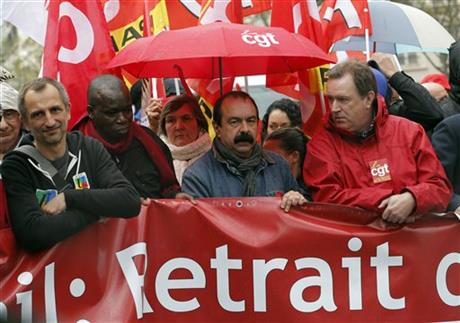
PARIS – A Communist labor leader here told the Peoples World in a recent interview that French government mandates weakening important labor law protections are a key factor in the waves of protests that have rocked this nation and in ongoing union efforts to organize workers.
“The labor law reform is a new way of organizing workers. It will drastically transform the labor code. It will fundamentally change the relationship between the workers and the boss,” Didier Le Reste, retired general secretary of the Railway Workers’ Union, told the People’s World here during the French Communist Party’s (PCF) 37th National Congress.
Le Reste, who spent 18 years as a steelworker before becoming a train controller and eventually a union leader and officer, sat down with the Peoples World as hundreds-of-thousands of French workers waged a wave of strikes protesting a presidential decree mandating an easing of regulations designed to protect workers’ rights. The mandates are being described as labor law “reform.”
The Railway Workers’ Union, which is part of the General Confederation of Labor (CGT) – France’s largest and oldest trade union federation – sees the reform as nothing more than European Union- enforced austerity.
“This is EU policy imposing the change. They want to open the door to competition in the railway industry,” Le Reste said. “This is an effort to de-nationalize France’s railways, the neo-liberalization of transport which will lower standards, wages and benefits.”
While over 150,000 people work in the French railway industry, Le Reste insisted the strikes aren’t just about one specific industry, job classification, trade or union.
He said the CGT and the Railway Workers’ Union “defends the interests of all the people.”
The labor law reform will “lower service quality for riders, cause the closing of stations and ticket booths. It will also weaken security measures,” Le Reste added, which is a very real and immediate concern among French citizens – especially after the horrendous terrorist attacks here last fall.
Le Reste informed the Peoples World of a 2013 rail accident in the Paris suburbs killing seven and leaving several dozens wounded due to a lack “technical checkups and oversight.”
He said, the labor law reform would make deadly accidents like this more likely.
“We are concerned about all workers, and their social conditions,” Le Reste emphasized.
Ironically, it is the “so-called Socialist Party,” the current governing party headed by President François Hollande, that is leading the charge to weaken workers’ rights, and impose by decree the anti-worker reform.
Le Reste said, the socialist government “isn’t socialist, especially in social-economic matters.”
“The government has deceived the people,” he added. “It is imposing policies in-favor of big corporations and financial interests.”
The socialists are now seeing a backlash against their pro-austerity policies, as the PCF, CGT and other progressive forces gear-up for the 2017 French presidential and general elections. The strike wave, the largest in recent French history, is but one manifestation of this fightback.
Front and center in Le Reste’s mind is the struggle to make sure French workers’ rights are not lowered to U.S. levels.
“It is currently not possible to fire workers for economic reasons here,” Le Reste said. The labor law reform would make layoffs – like in the United States – a common practice, which is partly why the fightback and strike wave has been so severe.
Additionally, the CGT regularly goes beyond the traditional union confines of addressing economic issues (wages, benefits, etc.), bargaining and grievances to “defend the jobless.”
“We are the only labor confederation with specific sections organized to activate the jobless. We mobilize the unemployed, help provide services and navigate the process of seeking benefits,” Le Reste continued.
While workers in France can’t be laid-off for economic reasons, companies can put a freeze on hiring and choose to not replace workers as they retire, defacto understaffing and overworking employees in many industries – arguably, becoming complicit in accidents like the one mentioned above.
The labor law reform, Le Reste added, “is an inversion of the norm. It would strangle the current law. It would strangle the national contract,” by granting employers more power to hire and fire outside of industry-wide contracts.
Union contracts are usually industry-wide in France, ensuring specific conditions for all workers, though dues paying union membership is actually quite small – hovering around eight percent of the workforce.
However, as Le Reste indicated, “unions have a different history here. Our conception of unions is different. We defend the interests of the entire working class.”
CGT is now planning port strikes for June 23 and 28, as on-going negotiations with the Hollande government are at a standstill.
Photo: CGT trade union leader Philippe Martinez, center, attends a demonstration against proposed changes to France’s work week and layoff practices, in Paris, Saturday, April 9, 2016. Protesters across France are marching to voice their anger at labor reforms being championed by the country’s Socialist government. | Christophe Ena/AP












Comments